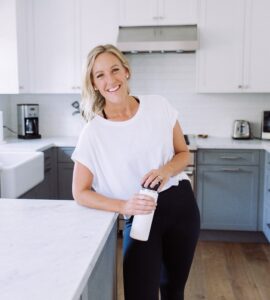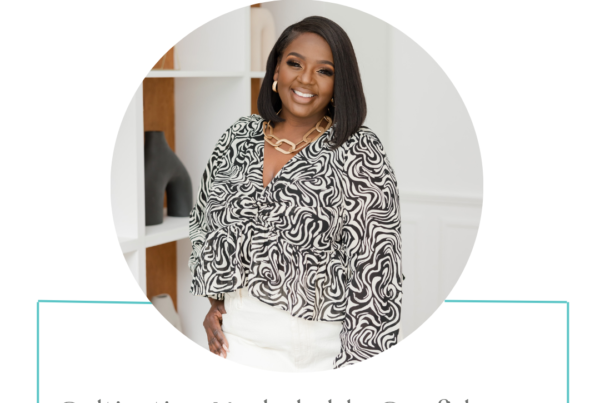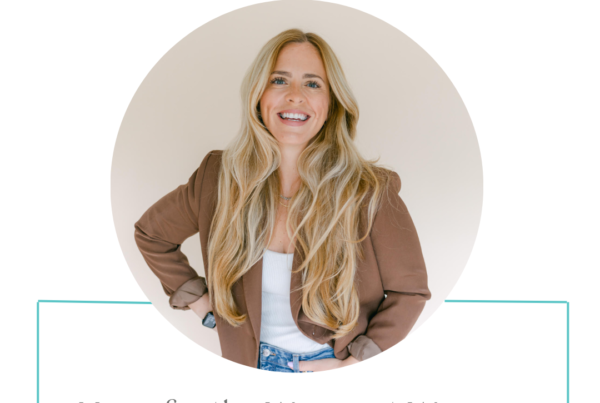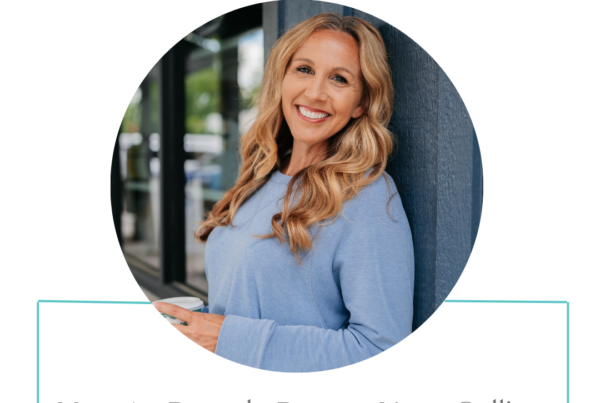You deserve to feel good — not just in your body, but in your whole being. Learn how to reclaim your health, fitness, and body in a journey toward holistic health. In our conversation with Pilates Instructor and author Robin Long we talk about:
- A new perspective on wellness and fitness that aligns more with God’s design.
- How to have grace with yourself when you feel uncomfortable in your body.
- How to experience a grace-over-guilt mindset to release shame and develop helpful habits in every season of life.
- How to reframe how you view your body, fitness, and food.
Get Allie’s book “Wonderfully Made: Discover the Identity, Love, and Worth You Were Created For”
About Robin Long
Robin Long is the founder and CEO of Lindywell, an online community that provides
Pilates workouts and wellness resources for busy women all over the world. She is a
certified Pilates instructor with eleven-plus years of teaching, writing, and guiding
women on their health and wellness journeys. Robin believes in a guilt-free, balanced
approach to health and fitness and is passionate about helping women care for their
bodies. Robin lives with her family in Santa Barbara, California.
Interview Script
Our guest today is Robin Long, and she is the founder and CEO of an online community that provides pilates workouts and wellness resources for busy women worldwide. She is also a Pilates instructor with 11-plus years of teaching, writing, and guiding women on their health and wellness journeys.
Robin believes in a guilt-free, balanced approach to health and fitness and is passionate about helping women care for their bodies. She’s also the author of her new book, well to the core, a realistic guilt-free approach to getting fit and feeling good for a lifetime. Robin lives down the highway from me down the 101 with her family in Santa Barbara.
Hey Robin, welcome. Hi, thank you so much for having me. I’m so excited to be here. Yeah, it’s, it’s fun to reconnect. I think you and I, I don’t know how initially we connected, but I think it was like over 10 years ago, I want to say through like blogging and that whole world. Totally. That was the blogging and Twitter.
I feel like it was that time of getting started, which is so fun. I still think you are one of them. I still have many people I met during that season with whom I’m still connected. So cool. Yeah, that’s so fun. And actually, you, you were on our podcast. I want to say it was eight years ago when we started. So it’s so fun to have you back and see how you’ve evolved with your business over the years.
So tell us more about yourself, Robin, and your wellness journey that led you to start your business, which we want to talk more about. Lindy.
Well, Sure. Well, as you mentioned, I am a mom. So I’m a mom of four kids. So I’m thinking about when our first conversation was, it’s changed quite a bit since then.
I have a 10 year old, an eight year old and five year old twins. Um, and so I am spending my days Juggling motherhood and running a company and, um, to speak to your point of where I started really with my health and wellness journey that led me to where I am today. Um, I’m not your typical fitness buff.
I’m not your typical fitness fanatic and people when they hear you own a wellness company or a fitness company. In fact, I’m not your typical While I did grow up dancing and playing competitive sports, I had, I did have a lot of that competitive nature in my world growing up as it related to exercise and fitness just through sports and dance.
Um, but eventually I really found myself in a place where I was struggling big time with body image. So really struggling, um, just really hating the way I looked being so hard on myself. Something that I’ve come to know is very common. And often people don’t talk about it enough. I don’t think of those body image struggles.
And even just yesterday, I was having a conversation. I was in an interview, and someone said, but, you know, you, you are, you know, you look fit. You look, you know, traditionally. healthy, all of these things. So how could you struggle with body image and image issues, but you and I both know that body image struggles can happen no matter what shape or size you are.
And I really, really struggled. So as a result, my relationship with food. Got to be quite unhealthy. Um, there were a lot of rules, a lot of restrictions, a lot of guilt around food. I had an unhealthy relationship with exercise, although I didn’t know it at the time, but exercise for me was really a means to an end.
It was a way to try to fix and change my body, a way to try to get smaller, a way to try to look quote-unquote better. And I just put a lot of pressure on myself. So that was my sole motivation around that time. I also started experiencing really debilitating anxiety. So paralyzing. I was just reflecting on it this morning, actually, because I drove past the doctor’s office that I had gone to in this season.
I just remember feeling like I was in this dark cave of anxiety that I couldn’t see out of. And I honestly didn’t know if life would ever feel normal again. I’m very happy to say it does. So if you are in that place, just know that there is hope. Um, but so between the body image issues, The unhealthy relationship with exercise, the anxiety.
It was around this time that I found Pilates. And when I did, I noticed an immediate change in not only the way my body was feeling. So I started releasing stress from my body. I started reconnecting to my body. I also started gaining strength, like real strength and muscles that I hadn’t experienced before.
But there was none of the beating myself up to get there. There was none of the, then, you know, working out hard and then going to reward myself with milkshakes or whatever I was doing at the time. It started for me a new pattern of working with my body instead of against my body and really starting to tune into what my body needs and support myself and my body as opposed to trying to fix it and change it and beat it up.
So it was a huge shift for me. And as a result, I really was like, this is my thing. I was working in commercial real estate. So I left that job to start teaching Pilates and that was about 14 years ago. And so since then, I’ve just been, you know, teaching in studios and private clients and all kinds of teaching.
And then, as you know, started blogging as well and started running online programs like 14, 13 years ago. And now that has just evolved over the past decade into what is now called Lindywell, which is our subscription, membership, and community. It’s such a beautiful journey, and I just love how you found Pilates and you were able to find joy and movement, and it seems like it gave you such freedom and healing.
So Robin, I have to tell you, I was flying to Nashville, and I was at the Santa Barbara airport, and I saw a bunch of girls with their Lindy Well bags, and, I think a bunch of your team was going somewhere. Awesome. I was looking for you, but I didn’t see you. And I thought about going up to one of the girls and be like, Hey, you know, where are you going?
I know Robin. So it’s so amazing to see your journey, how you started out, and how your Pilates community has touched so many women. And I know, um, what God did in your life through your healing journey. He’s. done in so many other girls’ and women’s lives through Lindywell. So it’s just beautiful. And personally, I am so inspired to, you know, lead this nonprofit, leading wonderfully made to see what is possible and the power of community, which you do, you do so well.
I love that. I wish you would have said hi. They were probably leaving our team summit. So I’d love to know that. Um, but thank you, you know, so much of what I do while I teach Pilates, and while I, you know, facilitate movement and health, my biggest passion is really helping people find that freedom. So you said it like to me, and I mentioned this in my book that you probably have seen, but.
If it doesn’t move you towards more freedom, then it’s not true wellness. So so much of the fitness world is rigidity and rules and restrictions and moves you so far away from true freedom. And so, for me, that was really. You know, something I’ve held really fast to over the last decade as I navigated my own body image issues, my own relationship with exercise, and health issues.
And to this day, I still think it’s really important to know I still have to be very aware of the internal conversation I’m having with myself, even though I’m in a completely different place than I was 15 years ago. But I think that goes to show. How powerful the messages are that we’ve received as women and girls of what it means to be beautiful, what it means to be worthy, what it means to be healthy, and it crosses a line at a certain point on what that health actually looks like.
Right? So for me, I think it’s just powerful to recognize. In order to work against the messaging that we see everywhere, every day, we have to actively be choosing a different path. So to this day, I will still catch myself and will still be like, Nope, that’s not the way I want to think. That’s not the type of decision I want to make.
That’s not the way I want to live my life. And so that’s what I’m really passionate about is helping people move towards that freedom. Yeah, I appreciate your authenticity too, you know, because I can see, you know, people see your beautiful book and you’re so cute, like running around Santa Barbara doing your Pilates workout.
And just for you being honest, this is a journey. This is something that I haven’t arrived at. But, continually pursuing freedom. And I think the more that we are vulnerable with other people that we, our struggles or our journey and what we experienced, there’s such deeper connection. So I think it’s really valuable that transparency that you have.
And I want to thank you that for that. I mean, we’re. That’s so much our heart at wonderfully made. And we also share your heart to see girls and women walk in freedom. Cause we believe where the spirit of the Lord is, there is freedom. So thank you for sharing about that.
I want you to touch briefly upon your realistic and your guilt free approach to feeling fit and feeling good for a lifetime. Can you touch upon this?
Yes. So, um, I love that verse by the way, and that the idea of freedom when it comes to wellness or this guilt free approach, I think for a lot of people. It gives them pause because, well, wait, I can’t just be a free for all. I can’t just throw all, you know, do nothing or not have any rhythms or routines or like, I’m going to lose my health or I’m not going to be fit or I’m not going to be healthy.
And I get that because we have gotten to a place where, you know, it’s harder to trust ourselves. Like if we’ve been following rigidity and rules or programs, it’s hard to trust ourselves that we can. Choose wellness without having restriction or plans around us, but to get to your question of that guilt free approach I think that’s the biggest thing.
I want to help people recognize that these two things can coexist So you can prioritize your wellness. You can care a lot about your health I do I think we all should care about our health and our wellness in our body But there’s a way to do that that is realistic And guilt free and free of that shame that so many of us experience when we do try to start a new workout plan or do get the courage as some people need to go to a gym or to try something new or to, you know, make a change in our life.
There’s so much guilt and shame that keeps people stuck. And I talk about reframing the way we are approaching exercise and health. And that is the first and most important thing to do. People will come to me and they will say, well, what should I eat and what should I do for a workout? And what should I end?
I’m like, Oh, that’s not the first question. First we got to consider how we are looking at this. What are we defining as successful? You know, what does success look like for us? So in the book, the first chapter is called a reframe for that reason. And so I talk about choosing grace over guilt, or letting go of that all or nothing mentality.
Some of these mindsets that we’ve inherited probably over the years, and we may not know where or why, but we’re living under these rules and these mindsets that may actually be keeping us stuck. So I love to find a way for people to recognize that it can be free of guilt. You don’t have to be a perfectionist.
You don’t have to be perfect. It’s okay to skip workouts. It’s okay to go off plan. And you can still be pursuing wellness, actually true wellness, um, when doing that. So I’m really passionate about that and it’s got to be realistic because not only do we know that all of the research supports, um, making smaller changes that lead to greater results over time.
We know that the resort research supports that absolutely no matter how you can make your goals so small, you are so much more likely to stick to it. So we lean into that. We also know that, um, progress is. Not as flashy and not as much of a quick fix as we have been led to believe. So we really lean into that realistic approach at Lindywell and say, we’re not, we’re not going to pretend that we’re telling you lose 10 pounds overnight, like these flashy things get fit in five days.
Those are all lies, and we have to be able to see through them. And when I was a new mom, I remember seeing all of these programs and thinking, there is no way I could do that. Like that looks great, but I can barely find 10 minutes for myself. Um, and so that is when a lot of, you know, our literally 10 minutes a day approach that we love to lean into started because.
That was all I could do. And some days, that’s still all I can do. And yet here I am all these years later, still moving forward instead of just throwing in the towel because I couldn’t commit to these hour-long workouts or these big plans and resolutions or goals. Yeah. So such an essential key on our journey is being realistic and having that grace over guilt.
Robin, what encouragement do you want to give to the woman who maybe has experienced Uncomfortable body changes and just doesn’t feel confident and does not feel free in her body.
Mm hmm. First, I want you to know that that is very normal. It is absolutely a part of life. Um, somewhere along the way, I think we got in our heads, many of us, that our bodies shouldn’t change, that they should stay the same through all of our seasons and all of the decades. That’s not true. As women in particular, our bodies are going to change the body that we had when we were 17 is different than the body when we’re 28 35 48 60 and 70, and 80.
Our bodies will change. So I think that’s the first when we think of like reframing the way we’re looking at things. And that alone does not change our worth or our value at all. So we have to be rooted in that and that is where we have to be very mindful of the messages we’re taking in, right? Because if we’re reading all of these things and watching all of these things that lead us to feel like we’d just be more valuable if our body fit the ideal that we had for it, um, we’re going to continually feel like our body needs to be different.
So that’s a couple of things. And then also. My suggestion is to consider how you can get reacquainted with your body. So we will all go through phases where we feel like we no longer recognize our body, whether that’s postpartum season, whether that’s after an injury or a surgery, an illness, um, I think of women who are going through perimenopause or menopause or all whole host of things.
We’re going to go through these different seasons of life as women, or we might look in the mirror and not recognize ourselves or not feel comfortable with ourselves. So this is where I love. Pilates or somatic type work. So exercises, and that’s a fancy word to just be like getting in your body, uh, connecting with your body and not the way it looks.
So not by in the mirror, although you can do some mirror exercises as well, but more through movement and figuring out what can you do physically in your body that does make you feel good. So that could be Pilates, that could be. A long walk that could be dancing. That could be stretching. It can be a lot of different things.
But finding a way to connect to your body in a way that makes you feel good about your body can help to Reframe kind of how you’re feeling in your body and even how you’re thinking about your body So it kind of like in those times we want to disconnect we want to leave our body And that’s something I used to do.
I would see my body is like an other as an enemy But this is the opposite of that. It’s like it’s an embodiment and We may not feel comfortable doing that in ways that we used to. So we might have to experiment with something new. Um, we all, no matter, even if your body is really uncomfortable, if you, um, finish, you know, of course, this is barring like medical issues, but if you finish like a long walk with a friend and you feel sweaty and energized, you will notice, you feel better about your body.
Even if it’s still the same size, has the same stretch marks, has the same wrinkles, has the same scars, whatever it might be, You will feel physically better about your body. So finding these ways to pursue embodiment can be really powerful. Yeah, that’s so important just to have grace that as women, it’s so natural for our bodies to change throughout our lives.
I know firsthand about how our bodies can change. I was a size three at one point in high school and at one point in my life was a size 16 and had a doctor, give a diagnosis of clinical obesity because after really, really hard season due to medication, my body had really significantly changed and.
It was it was that journey. Um, and I like how you talk about no matter what kind of movement we do We’re gonna feel more comfortable and there are also three practical things that really help me as well is I put this scale away I was weighing myself a lot And so I put it away And also what I found to be helpful is stepping away from the mirror and stop those unnecessary body checks, um, which make us hyper focused on our body and what we perceive as flaws.
And then also wearing clothes that are comfortable, that we feel good in, you know, that maybe aren’t too tight. So friends, if that’s you and you’re listening, I want to share those three practical tips that really helped me on my journey and just have so much grace with yourself. And , here at wonderfully made, we are about you knowing your value and worth and that it never, never changes and that it comes from God alone.
So whatever size you are, whatever number you are on the scale, your worth is secure and it will never change because it only comes from your creator.
Robin, if you could speak to teen girls and women worldwide, you had a microphone and millions and millions of teen girls and women were listening to you. What would you want to say to them?
There’s so many things I would want to say, but if I had to share one thing, it would be really what you just shared. I would be building upon that. And I love your tips by the way, but understanding that your worth, your value and your happiness. Is never going to come from the size and shape of your body.
So we may think that it will, we may continually, you know, set goals or things that we think that’s going to bring us to a place of joy or a place of fulfillment or a place of satisfaction, but it won’t. If we are not fine, if we are finding our satisfaction, our pride, our joy, all of those things in the size and shape of our body or the way that we look, we will continually be searching.
So to me, it is that intentionality that then is required because the world, everything in the world. And when I just say the world, I mean, I mean, magazines, I mean, um, advertisements, I mean, social media. I mean, all of these things that we will see. Will not tell us that message. They will tell us that we need to change, that we need to be more beautiful.
We need to have a smoother face. We need to have smaller thighs. We need to have shinier hair. That is the message that we receive in order to find happiness. And none of it’s true. So being a tent, paying a lot of attention to what we consume, who we listen to and what we let into our lives can have a significant impact on our ability to stay true to where that worth comes from.
Thank you. Amen to every single word you shared. Um, well, friends, this concludes part one of our interview with Robin. Again, if you’re watching, her book is well to the core. Um, a realistic, guilt-free approach to getting fit and feeling good for a lifetime.
.




